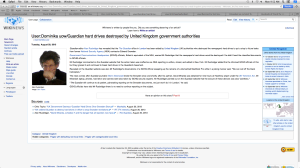I decided to double my chances of publication the same day I tried to publish my article about floods in Russia. I found an interesting and newsworthy story that focused on the type of corrupting that I thought Wikinews would want on their website. The story was about hard drives from the Guardian London office being destroyed by United Kingdom (UK) government authorities. The UK authorities had destroyed the hard drives to stop any future leaks from National Security Agency (NSA) contractor Edward Snowden. I felt that this was a story of great quality, relativeness and relevance to Wikinews and their story preference. However, while it was edited slightly, it was left to become stale.

This reminds me of how larger media outlets frame news in ways that either report with a biased view, report inaccurately or fail to report on certain issues at all. For example, Australia is always told about the war in Afghanistan or selected snapshots of the war, but wars in other countries that do not exactly relate to us, are not seen in our media. Additionally, the recent devastations with the Fukishima nuclear power plant have been ignored by mainstream media in Australia. I have always wondered why certain stories are given greater coverage and believe the answer is found in Snow and Benford’s argument that mass media “simplify and condense the world out there.” They go on to argue that this simplification and selection is made so that media outlets can create their own causes, consequences and solutions to the problems being reported.

With so many voices and so many frames, who is there to believe?
Image sourced: http://vitamindan.wordpress.com/2011/11/03/journalism-consumers-of-news-more-cynical-than-ever-and-they-should-be/
I was always under the impression that Wikinews sought the controversial stories that do not get the right exposure in other publications. Their failure to publish this story of mine and a number of others in my class, was a sign to me that they too are starting to follow mainstream media. It could also be possible that they’re afraid of publishing controversial stories as they fear the consequences this exposure may have for them. No matter what the reason is, I was made more aware of the influential and powerful forces evident in media circles that alter and frame news stories, and just how much I did not want to fall victim to their power in the future.